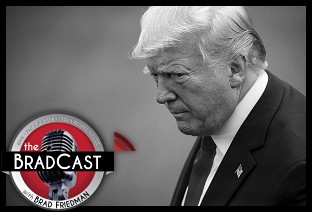 On today's BradCast: Try as they did, Donald Trump and the Republican Party were unable to steal the 2020 Presidential election. But they've got their plans in place for how to try and do it next time. They just need their currently stolen and packed Republican U.S. Supreme Court majority to help them pull it off. This week, SCOTUS chose not to do so --- even if they may in the future. But, in a separate decision, the Court did radically help increase the odds that our disgraced former President could be headed to jail before he's even able to run for office again. [Audio link to show is posted below summary.]
On today's BradCast: Try as they did, Donald Trump and the Republican Party were unable to steal the 2020 Presidential election. But they've got their plans in place for how to try and do it next time. They just need their currently stolen and packed Republican U.S. Supreme Court majority to help them pull it off. This week, SCOTUS chose not to do so --- even if they may in the future. But, in a separate decision, the Court did radically help increase the odds that our disgraced former President could be headed to jail before he's even able to run for office again. [Audio link to show is posted below summary.]
But first up today, some good news out of Virginia, where more people have been put to death by the Commonwealth's government than in any other state in the nation. Since their founding as a colony in 1608, some 1,390 people have been executed by the government there. Since SCOTUS reinstated the death penalty in 1976, Virginia has executed 113 people. That is more than any other state but Texas. This week, however, following Democrats gaining majorities in both chambers of the legislature, Virginia will now become the first Southern state --- and the 23rd in the union --- to abolish the abhorrent practice. And not a moment too soon, particularly given the systemic racism of their death penalty practices. For example, as the Death Penalty Information Center pointed out to Washington Post this week, "From 1900 to 1969...Virginia did not execute a single White person for any offense that did not result in death, while 73 Black men were executed for rape, attempted rape or robbery." So, yeah. Very good news out of Virginia this week, as Democratic Gov. Ralph Northam prepares to sign the long-overdue measures finally adopted by the state legislature.
Speaking of state legislatures, on yesterday's BradCast, we reported on this week's decision by SCOTUS to purge a bunch of held over Trump/GOP challenges to the 2020 election. Cases from Pennsylvania, Wisconsin, Michigan, Georgia and Arizona were all dismissed as moot. But dismissal of the Pennsylvania cases found three Justices --- Thomas, Alito and Gorsuch --- in dissent [PDF]. The two nearly identical cases in question had challenged the PA state Supreme Court's decision to extend the deadline [PDF] for the return of absentee ballots by three days after Election Day, due to the pandemic, slowdowns by the U.S. Postal Service and a provision in their state constitution mandating fair elections.
With all of their many other attempts to steal the 2020 election having failed, the GOP has now latched on to a radical interpretation of the U.S. Constitution's Elections Clause to argue that only state legislatures --- not Governors, not Secretaries of State, not State Elections Board or even state Supreme Courts --- may set any procedure for federal elections. Therefore, the Trumpers argued in their now-dismissed Pennsylvania challenges, the three day extension by the PA Supreme Court to enforce their state's Constitution by allowing for the arrival of late mail-in ballots cast by Election Day, was an unlawful violation of the U.S. Constitution.
Though no SCOTUS majority has ever affirmed this extreme reading of the federal Constitution, this is what many Republicans have now decided to believe to make themselves feel better after losing last November. In Pennsylvania, however, there were only 10,000 late arriving ballots and Joe Biden won the Keystone State by about 80,000. So SCOTUS decided the issue was moot and dismissed the cases. But Thomas, Alito and Gorsuch argued the case should have been heard anyway.
"A decision in these cases would not have any implications regarding the 2020 election," Alito wrote in dissent. "But a decision would provide invaluable guidance for future elections." On yesterday's program, I actually agreed with Alito and explained why.
Today, for a counter-point, we're joined by Slate's great legal journalist MARK JOSEPH STERN who offered a very different view from mine in his own coverage of Monday's decision by the high court. While justifiably destroying Justice Thomas' solo dissent in which he argued that mail-in ballots are bad even if there is no fraud, simply because people may think there is fraud, Stern also argued that SCOTUS was right to dismiss the case, rather than hear it. In part, he argues, that's because this Court has been packed so far to the extreme right. "We should be very afraid of what the Court would say," he tells me. "And that fear is enough for us to just hope that the Justices put off a decision on this matter for as long as humanly possible."
But I disagree with Stern and, in a very spirited debate, explain why. Who wins that one? Tune in and decide for yourself.
Stern also comments today on whether our failed former President should be concerned that his own packed and stolen U.S. Supreme Court, in an apparently unanimous decision on Monday, finally allowed Manhattan District Attorney Cyrus Vance to obtain Trump's financial and tax records as part of Vance's grand jury criminal probe into alleged bank, tax and insurance fraud by Trump and his organization. In short, Stern asserts, "the answer is yes," Trump should be very concerned. "They're looking at felony offenses here, not just civil offenses, run-of-the-mill white collar stuff, but serious crimes. I do think there's a serious chance that we could see an indictment of Donald Trump coming down the pipeline in the near future." Though he does add a caveat or two.
Of even more immediate concern, Stern recently wrote, Trump's efforts to interfere with Georgia's election results --- for example, cajoling and threatening the state's Secretary of State Brad Raffensperger to "find" enough votes to declare him the winner --- could spell trouble, and even jail time, even sooner.
"You'll see some people argue that Trump can't be convicted under this law --- the ban on criminal solicitation of election fraud --- because he didn't have the requisite state of mind, because he didn't actually want the Sec. of State to falsify records because he was deluded enough to believe that there were actually 12,000 secret votes for him out there that could be found. That's a question for the jury, that's not a question for the prosecutors or the grand jury. That is something Trump could argue at a criminal trial," says Stern, before adding: "I think that any reasonable reading of that transcript proves that Trump was, in fact, looking for the Secretary of State to falsify records, to commit election fraud. It is very difficult to read those sentences in any other way."
He explains why Trump could soon be looking at anywhere from 1 to 3 years in that criminal probe by the Fulton County (Atlanta) District Attorney and whether he thinks it is actually possible that a former President of the United States may actually receive prison time before all of this is said and done...
(Snail mail support to "Brad Friedman, 7095 Hollywood Blvd., #594 Los Angeles, CA 90028" always welcome too!)
|


 The GOP 'Voter Fraud'
The GOP 'Voter Fraud' 'Green News Report' 10/31/24
'Green News Report' 10/31/24
 'Closing Arguments'
'Closing Arguments' Trump Promises to be a Lawless, Authoritarian President. Believe Him: 'BradCast' 10/29/24
Trump Promises to be a Lawless, Authoritarian President. Believe Him: 'BradCast' 10/29/24 'Green News Report' 10/29/24
'Green News Report' 10/29/24 Election Heats Up: Ballots Burn, Billionaires 'Obey in Advance', Callers Ring In: 'BradCast' 10/28/24
Election Heats Up: Ballots Burn, Billionaires 'Obey in Advance', Callers Ring In: 'BradCast' 10/28/24 Musk's Privatized Internet Satellite System Threatens U.S. National Security
Musk's Privatized Internet Satellite System Threatens U.S. National Security Sunday 'VOTE NOW!' Toons
Sunday 'VOTE NOW!' Toons Harris on Hope, Trump's Fasc-ism in Bumpy Closing Days: 'BradCast' 10/24/24
Harris on Hope, Trump's Fasc-ism in Bumpy Closing Days: 'BradCast' 10/24/24 'Green News Report' 10/24/24
'Green News Report' 10/24/24 Kelly on Trump: 'Fascist', Admires Hitler, Disrespects Constitution and Disabled Vets: 'BradCast' 10/23/24
Kelly on Trump: 'Fascist', Admires Hitler, Disrespects Constitution and Disabled Vets: 'BradCast' 10/23/24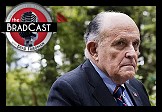 Accountability Comes For Rudy, Other Election Deniers: 'BradCast' 10/22/24
Accountability Comes For Rudy, Other Election Deniers: 'BradCast' 10/22/24 'Green News Report' 10/22/24
'Green News Report' 10/22/24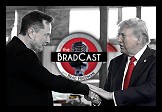 Elon Musk's 'Vote Buying' and Lying for Trump: 'BradCast' 10/21/24
Elon Musk's 'Vote Buying' and Lying for Trump: 'BradCast' 10/21/24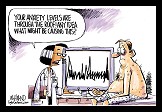 Sunday 'High Anxiety' Toons
Sunday 'High Anxiety' Toons 'Green News Report' 10/17/24
'Green News Report' 10/17/24 Fake v. Real Censorship and Trump/Fox Fetish-ized Grievance World: 'BradCast' 10/17/24
Fake v. Real Censorship and Trump/Fox Fetish-ized Grievance World: 'BradCast' 10/17/24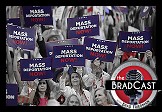 'Americans Aren't Prepared for Trump's Police State': 'BradCast' 10/16/24
'Americans Aren't Prepared for Trump's Police State': 'BradCast' 10/16/24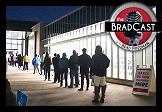 Good News for Georgia Voters, the Economy and Kamala Harris: 'BradCast' 10/15/24
Good News for Georgia Voters, the Economy and Kamala Harris: 'BradCast' 10/15/24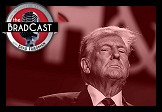 Fascism Comes to America: 'BradCast' 10/14/24
Fascism Comes to America: 'BradCast' 10/14/24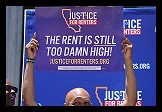 Institutional Landlords Flood CA Voters With Deceptive Ads on Props 33 and 34
Institutional Landlords Flood CA Voters With Deceptive Ads on Props 33 and 34 Milton's Mess, FL's U.S. House Liars, Trump's Made-in-China Bibles: 'BradCast' 10/10/24
Milton's Mess, FL's U.S. House Liars, Trump's Made-in-China Bibles: 'BradCast' 10/10/24 Whistleblower Org Readies to Support Election Officials: 'BradCast' 10/9/24
Whistleblower Org Readies to Support Election Officials: 'BradCast' 10/9/24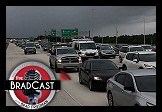 Florida Braces for 'Devastating to Catastrophic' Milton: 'BradCast' 10/8/24
Florida Braces for 'Devastating to Catastrophic' Milton: 'BradCast' 10/8/24
 VA GOP VOTER REG FRAUDSTER OFF HOOK
VA GOP VOTER REG FRAUDSTER OFF HOOK Criminal GOP Voter Registration Fraud Probe Expanding in VA
Criminal GOP Voter Registration Fraud Probe Expanding in VA DOJ PROBE SOUGHT AFTER VA ARREST
DOJ PROBE SOUGHT AFTER VA ARREST Arrest in VA: GOP Voter Reg Scandal Widens
Arrest in VA: GOP Voter Reg Scandal Widens ALL TOGETHER: ROVE, SPROUL, KOCHS, RNC
ALL TOGETHER: ROVE, SPROUL, KOCHS, RNC LATimes: RNC's 'Fired' Sproul Working for Repubs in 'as Many as 30 States'
LATimes: RNC's 'Fired' Sproul Working for Repubs in 'as Many as 30 States' 'Fired' Sproul Group 'Cloned', Still Working for Republicans in At Least 10 States
'Fired' Sproul Group 'Cloned', Still Working for Republicans in At Least 10 States FINALLY: FOX ON GOP REG FRAUD SCANDAL
FINALLY: FOX ON GOP REG FRAUD SCANDAL COLORADO FOLLOWS FLORIDA WITH GOP CRIMINAL INVESTIGATION
COLORADO FOLLOWS FLORIDA WITH GOP CRIMINAL INVESTIGATION CRIMINAL PROBE LAUNCHED INTO GOP VOTER REGISTRATION FRAUD SCANDAL IN FL
CRIMINAL PROBE LAUNCHED INTO GOP VOTER REGISTRATION FRAUD SCANDAL IN FL Brad Breaks PA Photo ID & GOP Registration Fraud Scandal News on Hartmann TV
Brad Breaks PA Photo ID & GOP Registration Fraud Scandal News on Hartmann TV  CAUGHT ON TAPE: COORDINATED NATIONWIDE GOP VOTER REG SCAM
CAUGHT ON TAPE: COORDINATED NATIONWIDE GOP VOTER REG SCAM CRIMINAL ELECTION FRAUD COMPLAINT FILED AGAINST GOP 'FRAUD' FIRM
CRIMINAL ELECTION FRAUD COMPLAINT FILED AGAINST GOP 'FRAUD' FIRM RICK SCOTT GETS ROLLED IN GOP REGISTRATION FRAUD SCANDAL
RICK SCOTT GETS ROLLED IN GOP REGISTRATION FRAUD SCANDAL VIDEO: Brad Breaks GOP Reg Fraud Scandal on Hartmann TV
VIDEO: Brad Breaks GOP Reg Fraud Scandal on Hartmann TV RNC FIRES NATIONAL VOTER REGISTRATION FIRM FOR FRAUD
RNC FIRES NATIONAL VOTER REGISTRATION FIRM FOR FRAUD EXCLUSIVE: Intvw w/ FL Official Who First Discovered GOP Reg Fraud
EXCLUSIVE: Intvw w/ FL Official Who First Discovered GOP Reg Fraud GOP REGISTRATION FRAUD FOUND IN FL
GOP REGISTRATION FRAUD FOUND IN FL



















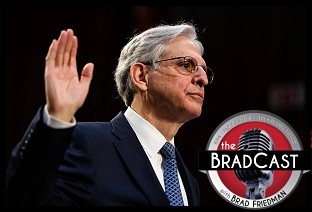 By a number of happily
By a number of happily  On today's
On today's  As their first official bills in each chamber of Congress --- H.R.1 in the House and S.1 in the Senate --- Democrats are proposing a remarkably ambitious election, campaign and ethics reform measure which would go a long way towards enhancing our system of democracy. At least one important rewrite is needed, however, in order to close a loophole in its mandate regarding hand-marked paper ballots.
As their first official bills in each chamber of Congress --- H.R.1 in the House and S.1 in the Senate --- Democrats are proposing a remarkably ambitious election, campaign and ethics reform measure which would go a long way towards enhancing our system of democracy. At least one important rewrite is needed, however, in order to close a loophole in its mandate regarding hand-marked paper ballots. On today's
On today's  Today's
Today's  As "today" is still ongoing, we'll need to keep the summary of today's
As "today" is still ongoing, we'll need to keep the summary of today's  As recently
As recently  On today's
On today's  "We will never surrender," Donald Trump told his brain-poisoned MAGA Mob over the weekend in Valdosta, Georgia after the American people decisively voted for him to lose the 2020 Election. "We will only win. We're gonna win. We always win. Somehow we find a way to win," he declared. Of course, a "win" for Trump, as we detail on today's
"We will never surrender," Donald Trump told his brain-poisoned MAGA Mob over the weekend in Valdosta, Georgia after the American people decisively voted for him to lose the 2020 Election. "We will only win. We're gonna win. We always win. Somehow we find a way to win," he declared. Of course, a "win" for Trump, as we detail on today's  The madness continues on today's
The madness continues on today's  On today's
On today's  On today's
On today's 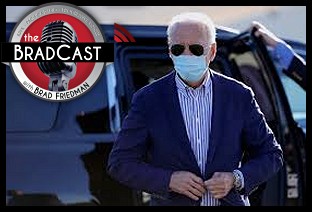 On today's
On today's  It's been a weekend and more of The Crazy since we last spoke. On today's
It's been a weekend and more of The Crazy since we last spoke. On today's 













